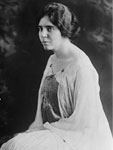Today, when it seems that everyone is getting a make-over, so are the suffragists. Iron Jawed Angels, a recent film by HBO, dramatizes the final years of the American woman suffrage movement, from 1912 to the winning of the vote in 1920. Historians familiar with the classic documentary One Woman, One Vote (1996) will be amused by how the suffragists have been updated and recast to mirror our own contemporary sensibilities. This film portrays these women as you have never seen them before: shopping for fashionable hats, smoking and lounging in their undergarments, and marching to a soundtrack of hip-hop rhythms. They are more than “new women”; they are 21st-century women in their casual manner, informal speech, and attitudes toward men and sexuality. With this approach, the film modernizes our political foremothers in an attempt to win new audiences in a postfeminist age.
The film modernizes our political foremothers in an attempt to win new audiences in a postfeminist age.
Tensions between veteran activists and “new suffragists” are at the heart of the story. Hilary Swank stars as the outspoken and determined Alice Paul, and Frances O'Connor plays her faithful comrade, Lucy Burns. The dynamic duo represents the more youthful, radical wing of the movement, which confronts the more conservative Carrie Chapman Catt (Anjelica Huston) and Anna Howard Shaw (Lois Smith), president of the National American Woman Suffrage Association (NAWSA). Allied with the Democratic party and the new president, Woodrow Wilson, Catt continues to support a gradual state-by-state campaign. She is portrayed as traditional, stuffy, and arrogant compared to the playful, optimistic, and impatient Paul who launches public demonstrations, supports a federal suffrage amendment, demands immediate results, and condemns the Democrats and Wilson, even in the midst of war. Paul and her allies eventually split with NAWSA to form a separate organization, the National Woman's Party. While historians have focused on the militant tactics of the new suffragists, the film fixates on their colorful personalities to separate them further from the old guard.
For an audience new to women's history, it conveys the very serious barriers to women's political participation and social justice.
Although the filmmakers try to reinvent the image of the suffragists, the storyline is based on the real troubles and triumphs of the campaign's final years. For an audience new to women's history, it conveys the very serious barriers to women's political participation and social justice. When the activists are physically attacked as they protest peacefully, the true hostility toward woman suffrage comes alive. The movie also contains a chilling portrayal of Paul's jail experience, showing her psychoanalyzed in the mental ward and violently force-fed after initiating a hunger strike. The film even acknowledges the racial tensions between white suffragists and African American activists, highlighting Paul's conflict with Ida B. Wells before the Washington, DC, parade in 1913. The film does take many liberties, however. For example, it overstates the influence of the radicals in winning the vote, downplaying the concerted effort of the entire suffrage spectrum and the impact of women's work and volunteerism during World War I. While historians have described Alice Paul as intellectually vigorous, personally conservative, and politically militant, the film transforms her into a spunky rebel who knows how to have fun but is still fully committed to her cause.
But this emphasis on beauty and charisma would surely disturb the suffragists, who would find these characters very foreign.
Is this what it takes to attract new audiences to women's history? In an age when many young women resist the feminist label, the film invites them to connect with feminists who are single, young, independent, sexually vibrant, and, of course, physically attractive. But this emphasis on beauty and charisma would surely disturb the suffragists, who would find these characters very foreign. This approach will also irritate historians of gender who have worked hard to define the suffragists as serious political actors and to integrate them into the American historical narrative. Viewed with a critical eye, Iron Jawed Angels could be useful for instructing students about history and popular culture, Hollywood and historical interpretation. It also forces us to grapple with more than feminism and its discontents. It can generate needed reflection on the ways historians can also be guilty of constructing historical personalities as they want to see them, by ignoring issues of race or dismissing the personal failures of our subjects. The challenge, then, remains to promote interest in women's history and still teach about who we think the suffragists were, rather than who we want them to be.

